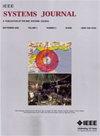Systems of Systems Governance Frameworks: A Thorough Scoping Review and Synthesis Towards Enhancing Healthcare Delivery
IF 4.4
3区 计算机科学
Q1 COMPUTER SCIENCE, INFORMATION SYSTEMS
引用次数: 0
Abstract
The healthcare delivery system exhibits inherent complexities stemming from its composition of multiple autonomous constituent systems with intricate interdependencies, characterized by dynamic and often decentralized operations. In this context, systems of systems (SoS) governance emerges as a promising paradigm to address these multifaceted challenges and optimize system-wide performance. This article conducts a comprehensive scoping review of SoS governance frameworks, focusing on their applicability to healthcare systems. Through a rigorous review process, 45 studies were selected from three major databases, yielding 37 distinct governance frameworks. The review analyzes publication trends, research objectives, applied frameworks, domains of application, and methodologies, providing a multifaceted understanding of the SoS governance landscape. The study highlights one framework that aligns closely with our proposed construct for healthcare system governance, and the alignment is discussed. In addition, technical components and variations across frameworks are identified and discussed, revealing the complexity and diversity of approaches in SoS governance.系统治理框架的系统:全面的范围审查和综合,以加强医疗保健服务
医疗保健服务系统表现出固有的复杂性,源于其组成的多个自主成分系统具有复杂的相互依赖关系,其特点是动态和分散的操作。在这种情况下,系统的系统(SoS)治理作为一种有前途的范例出现,以解决这些多方面的挑战并优化系统范围的性能。本文对SoS治理框架进行了全面的范围审查,重点关注其对医疗保健系统的适用性。通过严格的审查过程,从三个主要数据库中选择了45项研究,产生了37个不同的治理框架。该综述分析了出版趋势、研究目标、应用框架、应用领域和方法,提供了对SoS治理前景的多方面理解。该研究强调了一个与我们提出的医疗保健系统治理结构密切一致的框架,并讨论了这种一致性。此外,还识别和讨论了跨框架的技术组件和变化,揭示了SoS治理方法的复杂性和多样性。
本文章由计算机程序翻译,如有差异,请以英文原文为准。
求助全文
约1分钟内获得全文
求助全文
来源期刊

IEEE Systems Journal
工程技术-电信学
CiteScore
9.80
自引率
6.80%
发文量
572
审稿时长
4.9 months
期刊介绍:
This publication provides a systems-level, focused forum for application-oriented manuscripts that address complex systems and system-of-systems of national and global significance. It intends to encourage and facilitate cooperation and interaction among IEEE Societies with systems-level and systems engineering interest, and to attract non-IEEE contributors and readers from around the globe. Our IEEE Systems Council job is to address issues in new ways that are not solvable in the domains of the existing IEEE or other societies or global organizations. These problems do not fit within traditional hierarchical boundaries. For example, disaster response such as that triggered by Hurricane Katrina, tsunamis, or current volcanic eruptions is not solvable by pure engineering solutions. We need to think about changing and enlarging the paradigm to include systems issues.
 求助内容:
求助内容: 应助结果提醒方式:
应助结果提醒方式:


